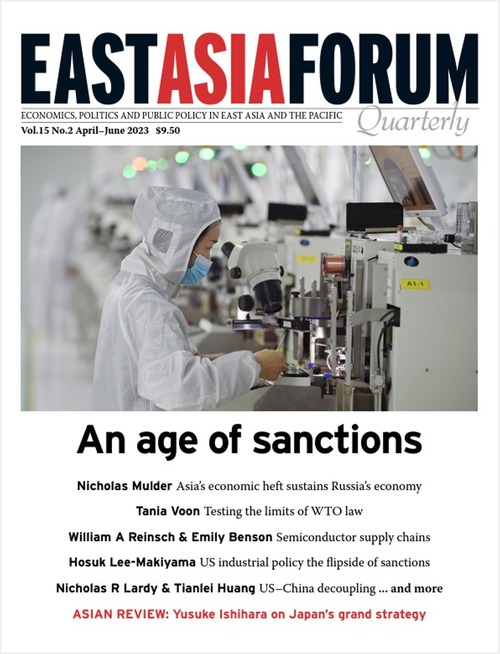Trade and geopolitics
East Asia Forum Quarterly: An age of sanctions
Published 13 June 2023
East Asia Forum, a leading platform for analysis on economics, international relations, and public policy in the Asia-Pacific, launched its latest quarterly on Monday. This edition, sponsored by the Hinrich Foundation, takes stock of the rising arc of economic statecraft: the repercussions of Russia’s war on Ukraine, trade weaponization, and governments’ growing use of coercion in service of foreign policy. Welcome to the age of sanctions.
Global trade stands at a crucial crossroads. The multilateral trading system that underpinned globalization for three-quarters of a century is becoming sundered by power politics and fogged by mistrust.
Global growth is projected to decline this year and remain anemic. Inflation, the rising rivalry between the world’s two largest economies, and Russia’s invasion of Ukraine weigh heavily on the global outlook. The war underscores how easily and quickly the trading ties between nations, once the measure and symbol of their comity, can be undone and weaponized. The conflict gummed up global supply chains, sending energy and food prices soaring. These shocks triggered too an unprecedented suite of economic sanctions, as governments threw their trade and investment heft behind their arsenals on the ground.
Sanctions and their ilk are at the juddering edge of systemic fragmentation. The trend predates the Ukraine war. Over the past decade, nations have increasingly turned to economic coercion and trade protectionism to meet geopolitical upheaval.
China has flung sanctions at Lithuania and embargoed trade with Australia and others over diplomatic differences. The United States has used trade barriers to confront Beijing’s rise. The breakdown of the dispute settlement mechanism at the World Trade Organization stymies the ability of economies to find solutions.
This issue of East Asia Forum Quarterly, sponsored and co-edited by the Hinrich Foundation, details the impact of sanctions as they rip well beyond the battlefield. It interrogates how far sanctions have succeeded in hobbling Russia’s war machine and questions their deterrent value outside of conflict or universal application. It details how supply chains have reshuffled around the reach of regulators. It asks how nations are using currencies to plumb opportunities created by the conflict. It explores the rising use of national security exceptions to multilateral accords and the disproportionate impact sanctions have had on the most vulnerable populations.
The world is at an inflection point no less profound than the postwar ruins which created the modern global trading system in 1947.
As a new landscape emerges, fraught with uncertainty, sanctions and trade weaponization have become the hallmarks of an age of geoeconomic fragmentation. If they portend a return to global conflagration, we hope these essays suggest ways to choose another course.
***
This editorial and the Quarterly were originally published on the East Asia Forum website. The issue was co-edited by:
- Chuin Wei Yap, Program Director, International Trade Research, Hinrich Foundation
- Samuel Hardwick, Economist, Australian National University
© The Hinrich Foundation. See our website Terms and conditions for our copyright and reprint policy. All statements of fact and the views, conclusions and recommendations expressed in this publication are the sole responsibility of the author(s).








